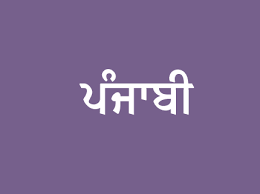Language/Panjabi/Grammar/Give-your-Opinion
Hi Panjabi learners! 😊
In this lesson, we will learn how to express our opinions in Panjabi. Giving your opinion is an essential skill if you want to express your thoughts and feelings effectively.
Consider exploring these related pages after completing this lesson: Subject Object Verb Order & Conditional Mood.
Vocabulary[edit | edit source]
Let's start by learning some essential Panjabi words and phrases that we can use to express our opinions:
| Panjabi | Pronunciation | English |
|---|---|---|
| ਮੇਰਾ ਵਿਚਾਰ ਹੈ | mera vichaar hai | In my opinion |
| ਮੈਂ ਸਵੀਕਾਰ ਕਰਦਾ ਹਾਂ | main saweekaar karda haan | I agree |
| ਮੈਂ ਅਸਹਿਮਤ ਹਾਂ | main asahimat haan | I disagree |
| ਮੈਂਂ ਨਹੀਂ ਜਾਣਦਾ | main nahin jaanda | I don't know |
| bohat hi vadiya | bohat hi vadiya | very good |
| ਵਿਅਕਤੀਗਤ ਰੂਪ ਵਿੱਚ | vyaktiGat roop vich | personally |
| ਸਾਡਾ ਬੜਾ ਜਾਣਕਾਰੀ ਹੈ | saada baRaa jaankaari hai | It is our experience |
Grammar[edit | edit source]
To express our opinion, we can use the following Panjabi grammar:
[Subject] + ਦੇ ਨਾਲ + [Opinion] + ਹੈ । (Hai means "is" in English)
For example:
- ਮੈਂ ਮੰਨਦਾ ਹਾਂ ਕਿ ਪਰਮਾਣੂ ਬੋਮਾ ਹਮਲੇ ਕਰਨ ਨਾਲ ਸਰਕਾਰਾਂ ਨੂੰ ਕੋਈ ਲਾਭ ਨਹੀਂ ਮਿਲਦਾ। (Main mannda haan ki parmaanoo boma hamle karan naal sarkaran nu koi labh nahi milada.) - I believe that governments do not benefit from conducting nuclear bomb attacks.
In this sentence, the subject is "I" (ਮੈਂ) and the opinion is "I believe that governments do not benefit from conducting nuclear bomb attacks" (ਮੈਂ ਮੰਨਦਾ ਹਾਂ ਕਿ ਪਰਮਾਣੂ ਬੋਮਾ ਹਮਲੇ ਕਰਨ ਨਾਲ ਸਰਕਾਰਾਂ ਨੂੰ ਕੋਈ ਲਾਭ ਨਹੀਂ ਮਿਲਦਾ). We have used ਦੇ ਨਾਲ to connect the subject and opinion.
Here are some more examples:
- ਮੇਰਾ ਵਿਚਾਰ ਹੈ ਕਿ ਸਾਡੇ ਜ਼ਿਲੇ ਵਿਚ ਕਿਸਾਨਾਂ ਨੂੰ ਹੋਣ ਵਾਲੇ ਬੀਮਾਰੀਆਂ ਦੇ ਇਲਾਜ ਲਈ ਇਜ਼ਤਨਾਮਾ ਦੇਣਾ ਚਾਹੀਦਾ ਹੈ। (Mera vichaar hai ki saade zile vich kisaanaan nu hon wale bimaariyaaan de ilaaj lai izatnaama dena chaahida hai.) - In my opinion, farmers in our district should be given medical compensation for their upcoming sickness.
- ਮੈਂ ਸਵੀਕਾਰ ਕਰਦਾ ਹਾਂ ਕਿ ਜਿਹੜਾ ਪਰਿਵਰਤਨ ਦੁਨੀਆ ਦੇ ਹਰ ਕੋਣੇ ਨੂੰ ਪ੍ਰਭਾਵਿਤ ਕਰਦਾ ਹੈ। (Main saweekaar karda haan ki jihda parivartan duniya de har kone nu prabhavit karda hai.) - I agree that change affects every corner of the world.
- ਮੈਂ ਅਸਹਿਮਤ ਹਾਂ ਕਿ ਹਰ ਸ਼ੁਕਰਵਾਰ ਭਾਰਤੀ ਵੱਡੇ ਬਜਟ ਰੁਕਾਵਟ ਲਈ ਧਰਨੇ ਬੈਠਣ ਨੂੰ ਕਮਜ਼ੋਰੀ ਦਿਖਾਉਂਦਾ ਹੈ। (Main asahimat haan ki har shukravaar bhaarti vadde bajt rukaawat lai dharne baithan nu kamzoori dikhanda hai.) - I disagree that sitting on protests every Friday shows weakness against the Indian government's delay of big budgets.
Examples[edit | edit source]
Let's have a dialogue to better understand how to use the vocabulary and grammar we have learned so far:
- Person 1: ਤੁਸੀਂ ਪੋਲੀਸ ਦੇ ਰੱਥ ਡਰਾਈਵਰ ਬਾਰੇ ਕਿਹਾ ਕੀ ਸੋਚਦੇ ਹੋ? (Tusiin polees de rathh duraivar baare ki sochde ho?) (What do you think about police van drivers?)
- Person 2: ਮੇਰਾ ਵਿਚਾਰ ਹੈ ਕਿ ਉਹ ਬੇਹੱਦ ਘੱਟੀਆ ਨੌਕਰੀ ਕਰਦੇ ਹਨ। (Mera vichaar hai ki uh behadd ghateeya naukri karday han.) (In my opinion, they do a very poor job.)
- Person 1: ਹਾਂ, ਤੁਸੀਂ ਸਾਹੀ ਕਹ ਰਹੇ ਹੋ। ਉਹਨਾਂ ਦਾ ਕਾਰਜ ਕੌਮ ਦੀ ਸੁਰੱਖਿਅਤੀ ਨੂੰ ਖ਼ਤਰਾ ਬਣਾਉਂਦਾ ਹੈ। (Haan, tusiin saahi kah rahay ho. Unhan da kaaraj kaum di surakhiati nu khatra banaunda hai.) (Yes, you are right. They endanger the safety of the public.)
Culture[edit | edit source]
In Panjabi culture, giving your opinion is considered a mark of honesty and integrity. It is important to express your opinion respectfully and without hurting the feelings of others. Panjabis are usually outspoken and straightforward, often using humor to convey their thoughts.
To improve your knowledge of the Panjabi language, you can also use the Polyglot Club website. Find native speakers and ask them any questions!
Recap[edit | edit source]
In this lesson, we learned how to express our opinions in Panjabi. We started by learning some essential words and phrases that we can use to express our thoughts and feelings. We then learned about the grammar that we can use to express our opinions, and we had a conversation to put our knowledge into practice. Finally, we learned about how giving your opinion is valued in Panjabi culture.
Don't forget to use ਦੇ ਨਾਲ to connect your subject and opinion when giving your opinion!
➡ If you have any questions, please ask them in the comments section below.
➡ Feel free to edit this wiki page if you think it can be improved. 😎
Other Lessons[edit | edit source]
Sources[edit | edit source]
- Panjabi: A Comprehensive Grammar (Routledge Comprehensive ...
- Panjabi: A Comprehensive Grammar - 1st Edition - Mangat Bhardwaj

